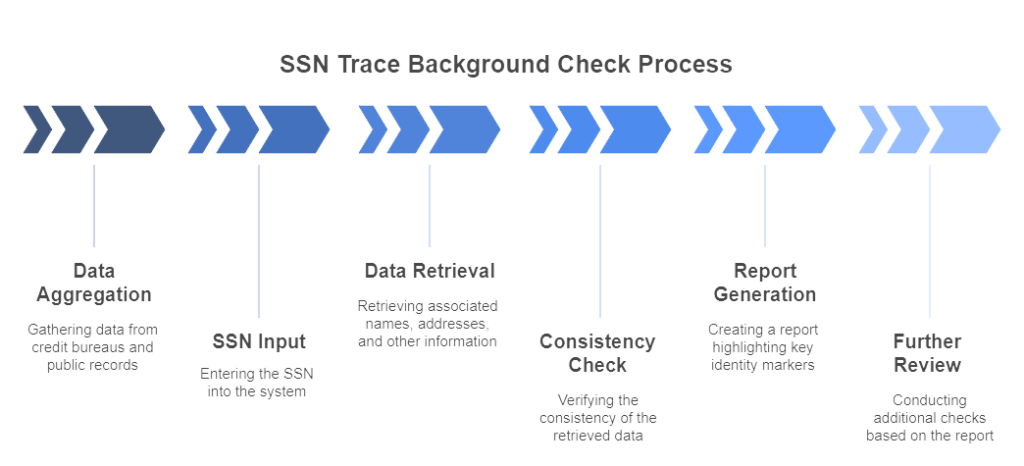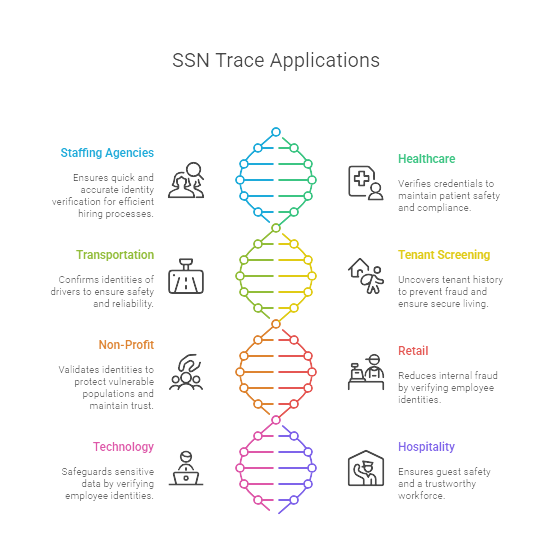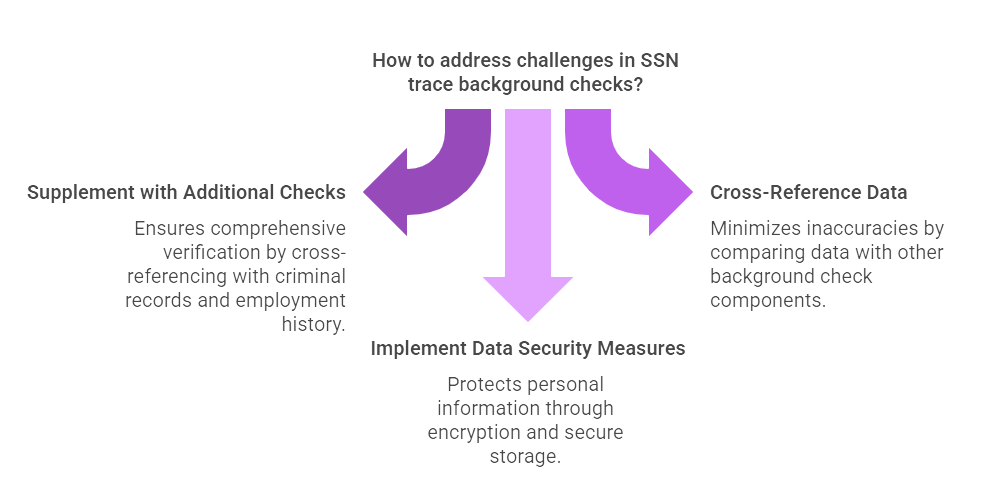Navigating the hiring process has its complexities, one of which is ensuring that a candidate's background aligns with company expectations. One powerful tool in this vetting process is the SSN trace background check. Understanding its mechanics and significance can better equip business owners, HR professionals, recruiters, and job seekers across multiple industries including staffing, healthcare, transportation, tenant screening, non-profit, retail, tech, and hospitality.
Key Takeaways
- SSN trace background checks are essential tools for verifying identities and uncovering hidden details in a candidate's past.
- They confirm an applicant's Social Security Number and reveal critical information like previous addresses and name variations.
- SSN traces act as initial steps that guide further checks such as criminal records, credit reports, and employment history verifications.
- These checks are crucial across various industries, including healthcare, transportation, and non-profits, to maintain trust and security.
- Compliance with federal and state legal guidelines, along with obtaining explicit consent from applicants, is essential when conducting SSN trace background checks.
Introduction
Ensuring you're hiring the right candidate isn't just about matching qualifications with job descriptions; it's about trust, safety, and credibility. A thorough background check can make or break this trust. Enter the SSN trace background check, a powerful tool to verify identities and uncover hidden details in an applicant's past.
An SSN trace background check is a crucial step in the hiring process. It helps confirm an individualâÂÂs Social Security Number (SSN) and reveals critical information like previous addresses and name variations. This is essential for industries ranging from healthcare to hospitality, where knowing who you're hiring is paramount.
This guide dives deep into the world of SSN trace background checks. WeâÂÂll explore how they work, why they matter, and the vital role they play in ensuring your hiring process is as secure and informed as possible.

Understanding SSN Trace Background Checks
An SSN trace background check is a specialized tool used within the background screening process to verify an individual's identity and uncover potential aliases or name variations. Essentially, it involves searching databases using an individualâÂÂs Social Security Number (SSN) to retrieve pertinent personal information.
The primary purpose of an SSN trace is twofold: it confirms the validity of the SSN provided and reveals any other names the individual may have used. This can include full names, maiden names, and common misspellings. By doing so, it ensures the individual is who they say they are and flags any potential red flags that might require deeper investigation.
Typically, an SSN trace often acts as the initial step in a comprehensive background check process. Once the SSN trace has verified the identity and provided a list of names and addresses associated with the SSN, these details guide additional checks, such as criminal background checks, employment history verifications, and credit reports. This integration ensures a systematic and thorough approach to background screening.
We speak of "due diligence" in HR, but what we're really working with is trustâÂÂthe vulnerable layer by vulnerable layer, all of it. I've sat in front of candidates with fantastic resumes, but it was the subtle precision of an SSN trace that filled in the outline, uncovering silences no interview could. Checks aren't about informationâÂÂit's about protecting the intangible strings holding teams, reputations, and futures together. In an era obsessed with velocity, taking time to verify isn't an obstacleâÂÂit's an investment in integrity. Behind every background report is a humble, profound question: Whom do we invite to join the story of our organization?
The Mechanics of SSN Trace Background Checks
Understanding the mechanics of SSN trace background checks is key to appreciating their impact in the hiring process. Let's break down how these checks work.
Data Sources
The starting point for SSN traces is data aggregation from credit bureaus, such as Equifax, Experian, and TransUnion. These institutions maintain extensive databases of information tied to Social Security Numbers. Additionally, public records play a crucial role. These can include everything from postal address histories to voter registration rolls and utility billing records. Together, these sources provide a comprehensive reservoir of data that can paint a detailed picture of an individual's identity footprint.
Process
Conducting an SSN trace involves a series of straightforward steps. First, the provided SSN is run through the credit bureaus' databases, pulling up any associated names, addresses, and other identifying information. This is typically automated, taking advantage of sophisticated matching algorithms to cross-reference data points. Once the initial data is aggregated, itâÂÂs checked for consistency, noting any discrepancies such as aliases or varied name spellings. The final output is a report that highlights key identity markers, which can then be handed off for further review.
Information Retrieved
The information retrieved in an SSN trace can be quite broad. Primarily, it includes previous and current addresses, which help in mapping a person's residential history. Name variations or aliases associated with the SSN are also uncovered, providing insights into any alternate identities a person might use. Additionally, the trace may return data on dates of birth and employment history through associated addresses, further aiding in the verification process.
Understanding these mechanics allows businesses to leverage SSN trace background checks effectively, ensuring a more thorough and reliable vetting process. The details obtained from SSN traces create a solid foundation for deeper, more targeted background checks, helping organizations build transparent and secure hiring protocols.

Importance of SSN Trace Background Checks
SSN trace background checks play a crucial role in the hiring process by serving as a foundation for identity verification and revealing potential red flags.
Identity Verification
One of the primary reasons for conducting an SSN trace is to confirm an applicantâÂÂs identity. In today's job market, ensuring that the person you are about to bring on board is exactly who they claim to be is non-negotiable. An SSN trace cross-references the information provided by the candidate with data from reliable sources like credit bureaus and public records. This initial step can significantly reduce the risk of identity fraud and misrepresentation, safeguarding both the company's interests and its existing employees.
Uncovering Discrepancies
Another significant aspect of SSN trace background checks is their ability to uncover discrepancies. During an SSN trace, the data retrieved often includes previous addresses, name variations, and date of birth. These pieces of information can help identify aliases or inconsistencies that might need further investigation. For instance, if a candidate has significant name variations or multiple addresses that were not disclosed, these could indicate potential issues such as hidden criminal records or ongoing litigation that the candidate failed to mention.
Precursor to Other Checks
An SSN trace is not just a standalone tool but a precursor to more comprehensive background checks. Essentially, it sets the stage for further investigations, such as criminal record checks, credit history evaluations, and employment verifications. By confirming the accuracy of foundational data, an SSN trace provides a reliable starting point for additional checks, ensuring that each subsequent step is built on verified information. This layered approach enhances the overall robustness of the background screening process, making sure no critical detail is missed.
In summary, SSN trace background checks are indispensable for modern hiring practices. They confirm identities, uncover possible misrepresentations, and pave the way for deeper investigations, making them an essential first step in building a trustworthy and secure workforce.
Industry Applications
Staffing Agencies
In the rapid-paced world of staffing agencies, speed and accuracy are paramount. With high volume hiring, thereâÂÂs little room for error. SSN trace background checks offer a streamlined solution to swiftly verify identities, ensuring that candidates are who they claim to be. This quick verification process enables staffing agencies to maintain a level of efficiency that matches their client demands while minimizing risks of identity fraud.
Healthcare
Healthcare roles often involve access to sensitive patient data and critical operations. Comprehensive background checks, starting with SSN traces, are essential to verify the credentials and backgrounds of healthcare professionals. This ensures that only those with clear and verified histories are entrusted with patient care, maintaining both compliance and safety standards within the industry.
Transportation
When it comes to transportation, whether itâÂÂs for logistics or passenger services, trust is a vital component. SSN trace background checks aid in confirming the identities of drivers and logistics personnel, thereby ensuring their credibility. This step is crucial in maintaining a dependable workforce, which in turn, upholds the safety and efficiency of transportation services.
Tenant Screening
Property managers rely on SSN trace background checks to verify the identities of potential tenants. This step helps in uncovering any aliases or previous addresses, providing a fuller picture of the tenantâÂÂs history. Such thorough vetting is essential to safeguard against fraud and ensure a secure living environment for all residents.
Non-Profit
Non-profit organizations often work with vulnerable populations, making it imperative to conduct diligent background checks. SSN traces play a key role in this process by validating the identities of volunteers and staff. This verification helps non-profits build a trustworthy team, crucial for protecting those they serve and maintaining their reputation.
Retail
In the retail sector, internal fraud and theft are significant concerns. SSN trace background checks offer a reliable method to confirm the identities of new hires, reducing the risk of employing someone with a problematic history. By ensuring proper identity verification, retailers can foster a more secure and trustworthy work environment.
Technology
The tech industry, with its access to sensitive data and intellectual property, requires rigorous background checks. SSN traces are a fundamental part of this process, helping to verify the identities of employees who will handle critical information. This level of diligence is necessary to safeguard company assets and maintain data security.
Hospitality
Creating a safe and welcoming environment is a top priority in the hospitality industry. SSN trace background checks help verify the identities of employees, from hotel staff to management. This not only ensures the safety of guests but also contributes to a trustworthy workforce, essential for providing quality service and maintaining the establishment's reputation.

Compliance and Legal Considerations
Federal Guidelines
It's crucial to follow federal regulations when conducting SSN trace background checks. The Department of Labor and the Federal Trade Commission (FTC) offer valuable guidance on compliant hiring practices. According to the Department of Labor guidelines, employers must ensure fair treatment throughout the hiring process, including when conducting background checks. The FTC advice underscores the importance of transparency and accuracy. It mandates that you provide applicants with notice about the background check and obtain written consent before proceeding. If any adverse action is taken based on the background check, the applicant must be notified and given a copy of the report along with a summary of their rights under the Fair Credit Reporting Act (FCRA).
State Laws
Beyond federal guidelines, each state has its own set of laws that affect how background checks should be conducted. For instance, Ohio background check laws specify requirements that may differ from those in Pennsylvania or other states. Ohio's regulations demand thorough criminal checks for certain job categories but also emphasize the importance of data accuracy and candidate rights. Meanwhile, Pennsylvania background check laws focus heavily on checks for roles involving children or vulnerable populations, requiring multiple clearances and offering protections for both employers and applicants. Knowing specific state laws ensures you are compliant not just federally, but locally.
Disclosure and Consent
One non-negotiable aspect of background checks is obtaining clear and explicit consent from applicants. This isn't just about good practice; it's the law. Providing comprehensive disclosure forms that explain why the information is being collected, how it will be used, and who will access it is essential. The consent form should be a standalone document, not buried in other paperwork. Being transparent fosters trust and complies with FCRA requirements, preventing legal headaches down the line.
By adhering to these federal and state guidelines, while also emphasizing clear disclosure and obtaining informed consent, you can navigate the legal complexities of SSN trace background checks effectively. This not only helps in fostering a transparent hiring process but also ensures you are well within the bounds of the law.
Potential Challenges and How to Address Them
SSN trace background checks, while invaluable, are not without their flaws. One common issue is incomplete or outdated information. SSN traces pull data from sources like credit bureaus and public records, but these databases aren't always up-to-date. To ensure comprehensive verification, it's crucial to supplement SSN traces with additional checks, such as criminal records and employment history verification.
Another challenge is the occurrence of false negatives or positives. A false negative might miss an alias or a previous address, whereas a false positive could link your candidate to someone with a similar name or SSN. To minimize these inaccuracies, cross-referencing obtained data with other background check components is essential.
Finally, data privacy is a significant concern. Candidates' personal information must be handled with utmost care to protect against breaches. Following best practices for data securityâÂÂlike encryption and secure storageâÂÂcan safeguard sensitive information, ensuring trust in the hiring process.

Frequently Asked Questions (FAQ)
Backgound processing can raise many questionsâÂÂfrom employers who would like to be compliant to candidates who would like to be transparent. This FAQ page simplifies common worries so you can know what to expect, what to watch out for, and how to move forward confidently and candidly.
What does disposition mean on a background check?
Disposition refers to the final status or outcome of any charges or cases listed on a background check. It reveals whether the case resulted in a conviction, acquittal, dismissal, or other final rulings.
Does a background check show if you graduated?
Typically, a standard background check doesnâÂÂt confirm educational credentials. Specialized education verification checks are required to substantiate graduation status, degrees obtained, and the institution attended.
What happens if you fail a drug test?
Failing a drug test during the hiring process usually results in the withdrawal of the job offer. For current employees, consequences vary by company policy and can include mandatory rehabilitation programs or termination of employment.
How can you conduct a background check on yourself?
To run a background check on yourself, you can utilize online background check services, request your credit report, obtain a copy of your criminal record from local law enforcement, and directly contact education and employment verification entities.
Are there specific considerations for background checks for non-profits?
Yes, non-profits often handle sensitive populations and may need more stringent background checks, including checks for sex offender registries, criminal history, and, sometimes, credit checks to ensure financial reliability.
Conclusion
In the realm of hiring, ensuring that the right individuals are brought on board is non-negotiable. SSN trace background checks offer a robust mechanism to verify identities, uncover discrepancies, and set the stage for deeper investigations. They serve as a cornerstone in the broader spectrum of background checks, reinforcing the trustworthiness of your team.
Thorough, compliant checks are not just about ticking boxesâÂÂtheyâÂÂre an investment in the integrity and safety of your organization. So, as you navigate the complexities of the hiring process, stay informed and prioritize these crucial checks. By doing so, you safeguard your organization, foster a culture of trust, and build a team you can truly count on.

GCheck Editorial Team
Meet the GCheck Editorial Team, your trusted source for insightful and up-to-date information in the world of employment background checks. Committed to delivering the latest trends, best practices, and industry insights, our team is dedicated to keeping you informed.
With a passion for ensuring accuracy, compliance, and efficiency in background screening, we are your go-to experts in the field. Stay tuned for our comprehensive articles, guides, and analysis, designed to empower businesses and individuals with the knowledge they need to make informed decisions.
At GCheck, we're here to guide you through the complexities of background checks, every step of the way.






